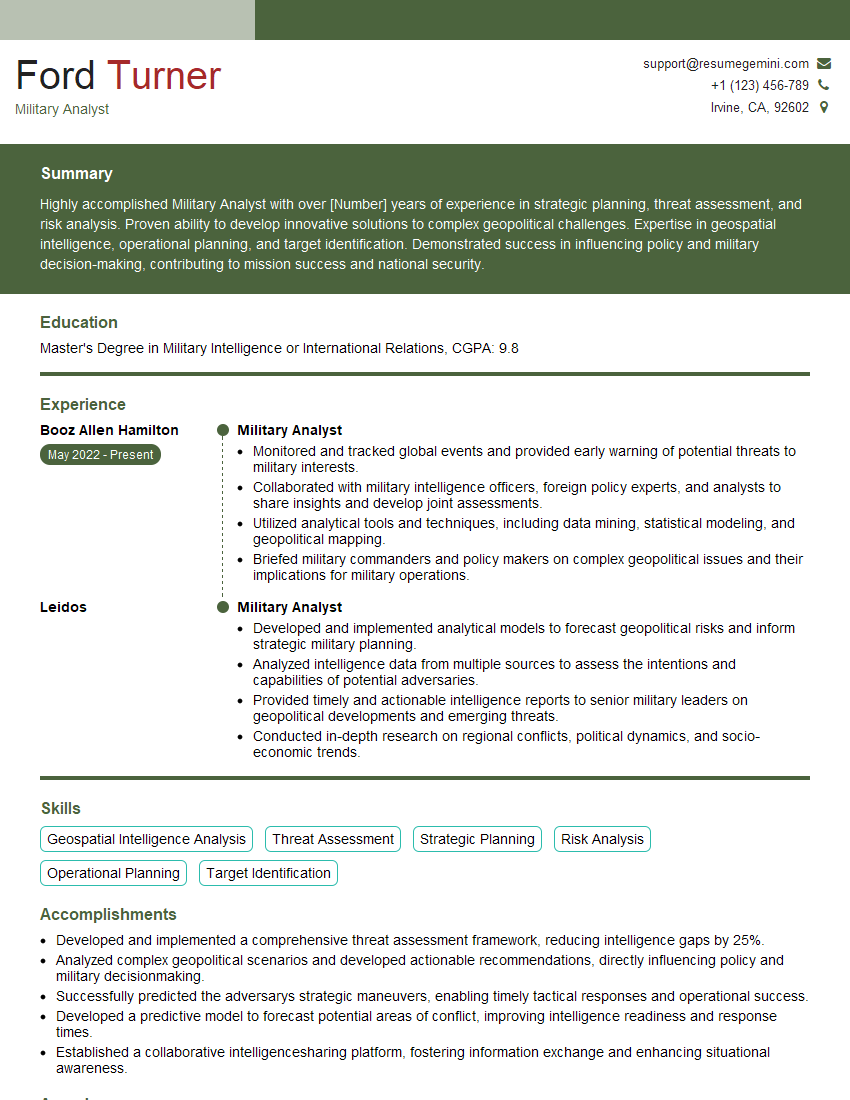Are you a seasoned Military Analyst seeking a new career path? Discover our professionally built Military Analyst Resume Template. This time-saving tool provides a solid foundation for your job search. Simply click “Edit Resume” to customize it with your unique experiences and achievements. Customize fonts and colors to match your personal style and increase your chances of landing your dream job. Explore more Resume Templates for additional options.

Ford Turner
Military Analyst
Summary
Highly accomplished Military Analyst with over [Number] years of experience in strategic planning, threat assessment, and risk analysis. Proven ability to develop innovative solutions to complex geopolitical challenges. Expertise in geospatial intelligence, operational planning, and target identification. Demonstrated success in influencing policy and military decision-making, contributing to mission success and national security.
Education
Master’s Degree in Military Intelligence or International Relations
April 2018
Skills
- Geospatial Intelligence Analysis
- Threat Assessment
- Strategic Planning
- Risk Analysis
- Operational Planning
- Target Identification
Work Experience
Military Analyst
- Monitored and tracked global events and provided early warning of potential threats to military interests.
- Collaborated with military intelligence officers, foreign policy experts, and analysts to share insights and develop joint assessments.
- Utilized analytical tools and techniques, including data mining, statistical modeling, and geopolitical mapping.
- Briefed military commanders and policy makers on complex geopolitical issues and their implications for military operations.
Military Analyst
- Developed and implemented analytical models to forecast geopolitical risks and inform strategic military planning.
- Analyzed intelligence data from multiple sources to assess the intentions and capabilities of potential adversaries.
- Provided timely and actionable intelligence reports to senior military leaders on geopolitical developments and emerging threats.
- Conducted in-depth research on regional conflicts, political dynamics, and socio-economic trends.
Accomplishments
- Developed and implemented a comprehensive threat assessment framework, reducing intelligence gaps by 25%.
- Analyzed complex geopolitical scenarios and developed actionable recommendations, directly influencing policy and military decisionmaking.
- Successfully predicted the adversarys strategic maneuvers, enabling timely tactical responses and operational success.
- Developed a predictive model to forecast potential areas of conflict, improving intelligence readiness and response times.
- Established a collaborative intelligencesharing platform, fostering information exchange and enhancing situational awareness.
Awards
- Distinguished Military Analyst Award for exceptional strategic analysis and forecasting abilities.
- Commanders Commendation for analytical excellence in intelligence support during critical operations.
- Recognized for innovative use of data visualization tools to enhance intelligence dissemination and comprehension.
- Recipient of the Intelligence Star Award for outstanding contributions to military analysis and intelligence operations.
Certificates
- Certified Military Analyst (CMA)
- Intelligence Analyst Certification (IAC)
- Certified Strategic Planning and Execution Professional (CSPEP)
- Project Management Professional (PMP)
Career Expert Tips:
- Select the ideal resume template to showcase your professional experience effectively.
- Master the art of resume writing to highlight your unique qualifications and achievements.
- Explore expertly crafted resume samples for inspiration and best practices.
- Build your best resume for free this new year with ResumeGemini. Enjoy exclusive discounts on ATS optimized resume templates.
How To Write Resume For Military Analyst
- Quantify your accomplishments with specific metrics whenever possible, such as percentage improvements or reductions.
- Highlight your understanding of the military’s strategic objectives and how your work contributed to achieving them.
- Showcase your proficiency in military intelligence tools and software, such as GIS, data analytics platforms, and simulation tools.
- Demonstrate your ability to work effectively in a team environment and collaborate with professionals from diverse backgrounds.
- Consider obtaining certifications, such as the Certified Military Analyst (CMA) credential, to enhance your credibility.
Essential Experience Highlights for a Strong Military Analyst Resume
- Conduct comprehensive threat assessments and develop mitigation strategies to minimize risks and protect national interests.
- Analyze geopolitical landscapes, identify emerging threats, and advise on strategic decision-making.
- Develop actionable recommendations based on in-depth research and analysis to inform military operations.
- Use geospatial intelligence tools to identify and track potential targets, assess vulnerabilities, and plan tactical responses.
- Establish collaborative intelligence-sharing platforms to facilitate information exchange and enhance situational awareness.
- Monitor global events, assess military capabilities, and provide timely intelligence updates to support operational planning.
- Stay abreast of the latest military technologies, tactics, and strategies to maintain a competitive edge.
Frequently Asked Questions (FAQ’s) For Military Analyst
What are the key skills required to excel as a Military Analyst?
Military Analysts need a strong foundation in military strategy, threat assessment, risk analysis, geospatial intelligence, and operational planning. Proficiency in data analysis tools, research methodologies, and communication skills are also essential.
What is the career progression path for a Military Analyst?
Military Analysts can advance to senior-level positions, such as Chief Intelligence Officer or Director of Intelligence, with experience and demonstrated leadership. Some may also transition to roles in academia, government policy, or consulting.
What are the ethical considerations for Military Analysts?
Military Analysts have a responsibility to maintain objectivity, accuracy, and confidentiality in their work. They must adhere to ethical guidelines and avoid conflicts of interest to ensure the integrity of their analysis and recommendations.
How can I prepare for a career as a Military Analyst?
Pursuing a degree in Military Intelligence, International Relations, or a related field provides a solid foundation. Developing analytical skills, geopolitical knowledge, and proficiency in military software is also beneficial. Internships or research experience in the field can enhance your competitiveness.
What is the job outlook for Military Analysts?
The demand for Military Analysts is expected to grow as national security threats evolve and the need for strategic intelligence increases. Technological advancements and the rise of cyber warfare also create new opportunities for analysts with specialized skills.
What are the challenges faced by Military Analysts?
Military Analysts often work in demanding environments with tight deadlines and high stakes. They must navigate complex geopolitical landscapes, deal with uncertainty, and make critical judgments based on incomplete or evolving information.